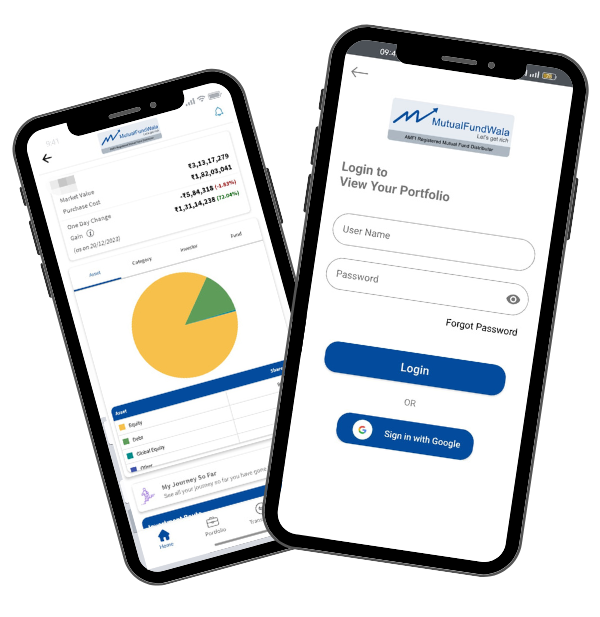Long Term Mutual Fund Investment
Investing in mutual funds can be a smart move for individuals seeking to grow their wealth over the long term.
Long term Mutual fund investments offer a diversified portfolio of stocks, bonds, or other assets managed by professionals, making them a popular choice for both novice and experienced investors.
However, determining how long to invest in a mutual fund depends on several factors, including your financial goals, risk tolerance, and investment horizon.
Identify the strengths and weaknesses in your portfolio based on returns, volatility, asset allocation, and more, enabling you to make informed decisions related to your portfolio.
Review all your mutual Fund Investments in one place with MutualFundWala
Understanding Mutual Fund Investment Timeframes
1. Short-Term Goals: If you have short-term financial goals, such as saving for a down payment on a house or funding a vacation, investing in mutual funds may not be the best option.
The short-term volatility of the market could mean that your investment might not have enough time to recover from any downturns.
2. Medium-Term Goals: For medium-term goals, such as saving for a child’s education or buying a car, a time horizon of three to five years may be appropriate.
This allows you to potentially benefit from market growth while also giving your investment time to recover from any short-term fluctuations.
3. Long-Term Goals: If you’re investing for retirement, which is typically a long-term goal, you can afford to take more risks and ride out market fluctuations.
In this case, it’s advisable to invest in mutual funds for the long haul, ideally for 10 years or more. This time frame allows you to benefit from compounding returns and weather market ups and downs.
Speak with our experts to optimize your investments and make informed decisions related to your portfolio.
Factors Influencing Mutual Fund Investment Timeframe
1. Risk Tolerance: Your comfort level with risk plays a significant role in determining your investment timeframe. If you have a low risk tolerance, you may prefer a longer investment horizon to minimize the impact of market volatility. Conversely, if you’re comfortable with risk, you might be willing to invest for the short term to potentially earn short term profits.
2. Market Conditions: Market conditions can influence how long you should invest in a mutual fund. During periods of economic uncertainty or market volatility, it may be wise to extend your investment time frame to allow for potential recovery from downturns. In contrast, during bullish market conditions, you might consider a shorter investment horizon.
3. Investment Strategy: Your investment strategy also affects your investment timeframe. If you’re using a buy-and-hold strategy, intending to hold onto your mutual fund investments for an extended period, a long-term timeframe is appropriate. On the other hand, if you’re engaging in active trading or market timing, your investment horizon may be shorter.
Speak with our experts to optimize your investments and make informed decisions related to your portfolio.
Importance of Regular Review
Regardless of your initial investment timeframe, it’s crucial to regularly review your mutual fund holdings and adjust your strategy as needed.
Life circumstances, financial goals, and market conditions can change over time, necessitating a reassessment of your investment plan.
Conduct periodic reviews, perhaps annually or semi-annually, to ensure your investment strategy remains aligned with your objectives.
Conclusion
In summary, the appropriate investment timeframe for mutual funds depends on your financial goals, risk tolerance, and investment strategy.
For short-term goals, a conservative approach with a shorter investment horizon may be prudent. For long-term goals like retirement, investing in mutual funds for 10 years or more can maximize the potential for growth.
Regularly review your investments to ensure they continue to align with your objectives and make adjustments as necessary. By understanding these factors and staying informed about market conditions, you can make informed decisions about how long to invest in mutual funds.











